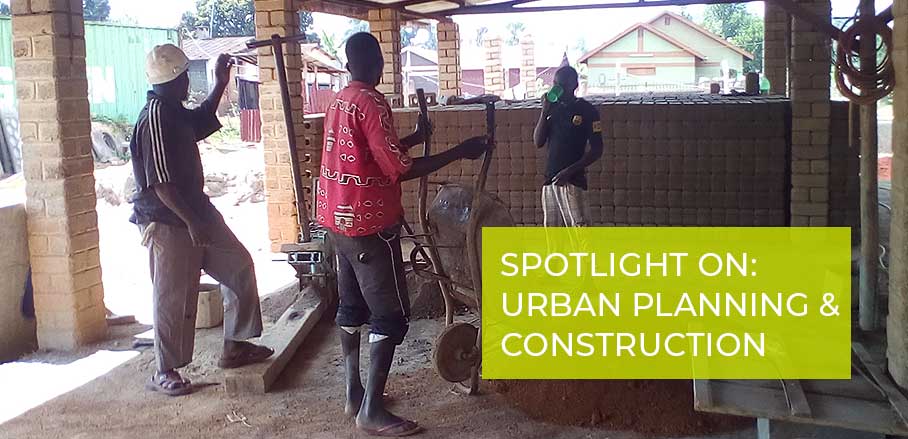The Future is Community-led: How People Are Improving Their Neighbourhoods Across Africa
All across Africa, the most rapidly urbanising continent, locals are taking action to improve their neighbourhoods and get access to adequate housing and services. Leading up the UN Habitat Assembly, URBANET presents examples from Senegal, Uganda, and Zimbabwe.
In the streets of Djiddah Thiaroye Kao, one of the poorest municipalities of Dakar’s suburbs, sand is abundant but schools, health centres and playgrounds are not. Kadia, a middle-aged woman who has spent most of her life in Djiddah and her savings group, Mashallah, joined hands to change this.
They planned, designed and oversaw the construction of a playground for the neighbourhood. The playground is located on a plot of land which had been abandoned since the recurrent floods that devastated the municipality and chased thousands of families from their homes in the 2000s. Before the municipality transferred ownership of the land to Kadia’s savings group to redesign the space, it had served as a waste dumping site and was considered dangerous.
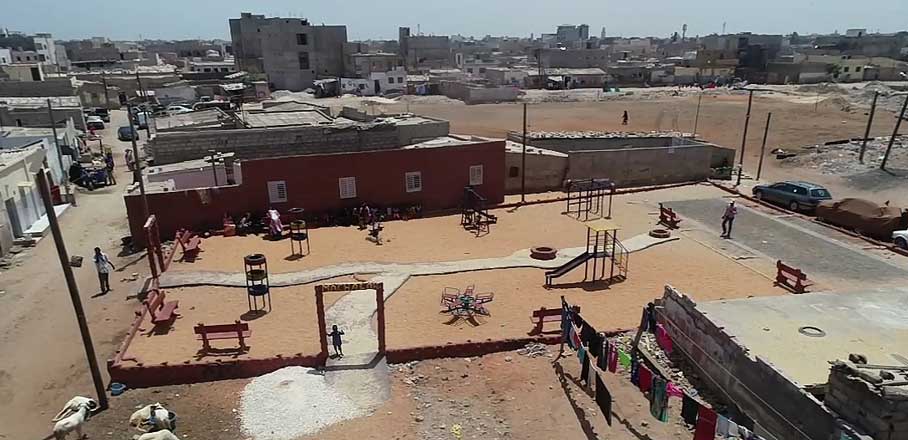
© urbaSen 2019
A few sandy miles further, in the municipality of Guinaw Rail, Arame and her savings group are having their weekly meeting. Arame is a mother of three and just like Kadia one of the nearly 5,000 members of the Senegalese Federation of Inhabitants spearheading 200 savings groups. Besides saving up for their livelihood activities on a weekly basis, today her group also selects one of its members as the next beneficiary of the federation’s home improvement programme. Earlier, Arame had accessed affordable finance and received technical assistance to raise the ground level of her home, rebuild two rooms damaged during the floods, and fix the roof.
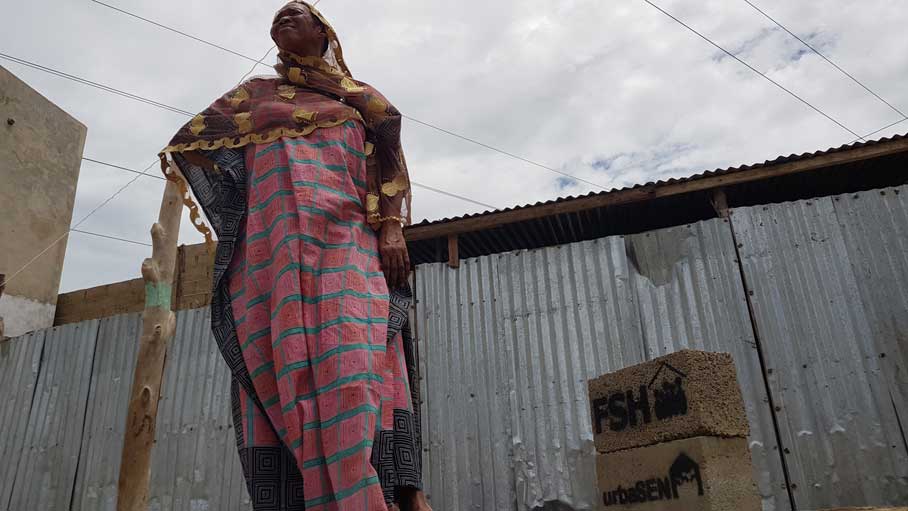
© urbaSen 2019
Strengthening Capacities and Creating Local Income through Community-Organising
In Uganda, youth from the city of Jinja who are members of the National Slum Dwellers Federation of Uganda (NSDFU), are working hard in the Walukuba Materials Training Centre. The centre is a site of planning, building, and learning that trains youth in the production of sustainable building materials and construction techniques. It hosts a community hall for meetings and trainings, and accommodation facilities.
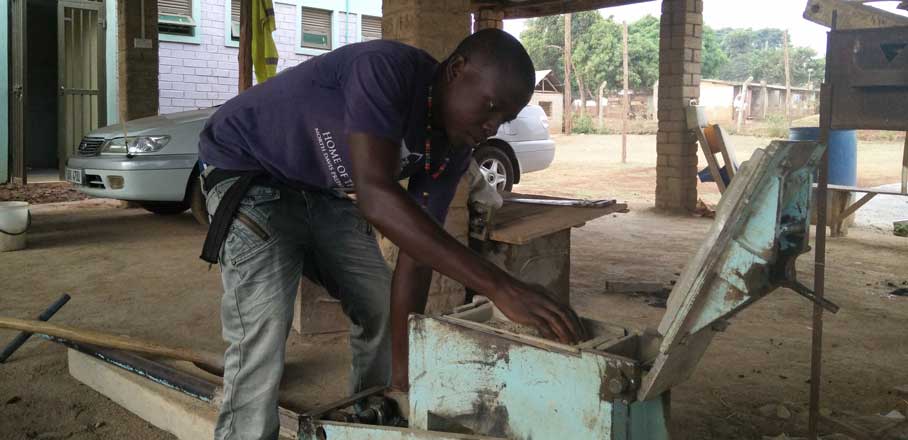
© SDI 2019
The Walukuba Centre is designed as a social enterprise that does not depend on donor funding. The NSDFU manages the centre, develops skills, and generates local employment opportunities for 16 permanent staff, while reducing the construction costs and environmental impact of home upgrading projects in the area. The local council has not only approved the buildings materials that are produced in the centre, but is actively promoting their use in upgrading projects to save costs and support the local economy. Exchanges with Federation members across Uganda have expanded the training and capacity building of the community.
Joining Hands to Improve Slums
Tendai and her fellow members of the ten savings groups located in Dzivarasekwa Extension, one of Harare’s 72 slums, are proud of what they have achieved through mobilizing and hard work. They are part of the Dzivarasekwa Slum Upgrading Project, which is being implemented by the alliance of the Zimbabwe Homeless People’s Federation and Dialogue on Shelter for the Homeless Trust in partnership with the City of Harare and the central government.
Construction began in 2011 and is still ongoing, with 480 families as primary beneficiaries of land for housing development leading to secure tenure and provision of adequate water and sanitation facilities among other essential services. The City of Harare was in charge of the infrastructure installations, while Dialogue on Shelter and the Federation spearheaded the superstructure interventions.
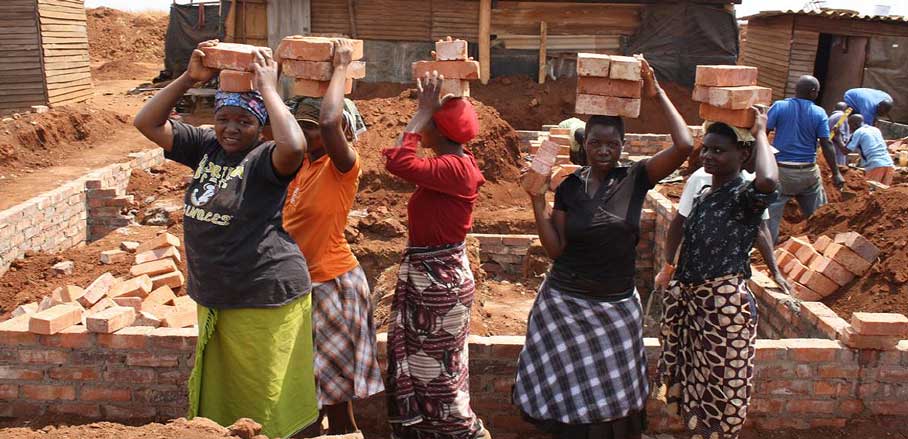
© SDI 2019
Before the slum upgrading project, Tendai and her neighbours collected relevant data on their slums and generated their own settlement development plan. The Dzivarasekwa Slum Upgrading Project is the first such programme in Harare to take a people-led approach to upgrading, and expectations are high to extend the programme to other slums.
The Urban Poor Organise for Access to Adequate Housing and Basic Services
Kadia, Arame, Tendai and the people who run and work at Walukuba Centre in Jinja live thousands of miles apart, but they do have a few things in common: they live on the most rapidly urbanising continent, and their daily lives are closely intertwined with the struggle for access to basic services, adequate housing, safety and livelihood security for their families. But most importantly, they organise and take action.
Their stories are only a few examples of the incremental transformation processes taking place in low-income communities and informal settlements across Africa. They illustrate what is possible when poor urban communities organise. Provided with the means and tools to improve their homes and neighbourhoods, they become drivers for positive change and can allocate funds according to their own priorities, thus participating in a community-led habitat process.
Community-led habitat stands for community-owned, -driven, and -controlled processes that allow for developing, improving, and upgrading homes and neighbourhoods from the bottom up. The approach is based on the conviction that while governments cannot cater to all the needs of a fast-growing urban population, they can enable the urban poor to access land, technical assistance, skills, and affordable finance to build and improve their settlements for and by themselves.
For community-led habitat processes to happen, communities have to organise and establish partnerships with a wide range of stakeholders of the urban fabric, particularly local and national governments.
CoHabitat Provides Tools for Community-led Housing Solutions
There are thousands of stories like those of Kadia, Arame, Tendai and the youth of Jinja, but only very few of them are visible and recognised. The CoHabitat Network that brings together umbrella organisations of local community-led habitat initiatives and their allies from all over the world seeks to change this.
The Network develops tools to make people-led housing solutions more attainable and widespread. Among these tools are an open-data platform Co-habitat.io to document actors and share stories, and awards and regional meetings which aim to showcase outstanding initiatives and encourage public recognition and peer learning.
After similar initiatives in Europe, Latin and North America, Slum Dwellers International, with the support of World Habitat and UrbaMonde, has launched the first edition of the Community-Led Habitat Awards for Africa. The winners of the awards will share their stories at the inaugural UN-Habitat Assembly in Nairobi in the end of May, and organise impact events in their home countries for continued learning and to leverage visibility and gain local recognition.
Meet people like Kadia, Arame, and their fellow savings group members at the UN-Habitat Assembly in Nairobi and read about their projects and other community-led habitat stories on the online platform!
